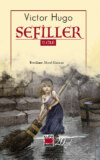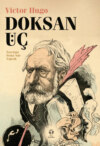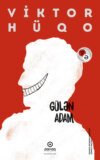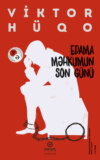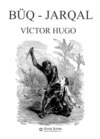Kitabı oku: «Ninety-Three», sayfa 9
III
A CORNER NOT DIPPED INTO THE STYX
Was such a man in very deed a man? Could the servant of all men feel a personal affection? Was he not too much of a soul to possess a heart? That vast embrace, enfolding everything and everybody, could it be limited to one? Could Cimourdain love? We answer, yes.
In his youth, when he was a tutor in an almost princely family, he had a pupil, the son and heir of the house, whom he loved. It is easy to love a child. What is there that one cannot forgive a child? One forgives him for being a lord, a prince, a king. His innocent age and his weakness make one forget the crimes of his race and the arrogance of his rank. He is so little that one pardons him for being great, the slave forgives him for being the master. The old negro idolizes the white nursling. Cimourdain had conceived a passionate love for his pupil. Childhood is so ineffably charming, it absorbs all love. All the power of loving in Cimourdain's nature had, so to speak, concentrated itself upon that child; the heart, condemned to solitude, fed upon this sweet and innocent creature, which it loved with the combined tenderness of a father, a brother, a friend, and a creator. To him he was indeed a son, – not of the flesh, but of the soul; he was not his father, the author of his being, but he was his master, and this was his masterpiece. He had made a man of this little lord, – possibly a great man, who knows? Thus run our dreams. Without the knowledge of the family, – for does one require permission to create an intelligence, a well-directed will, and an upright character? – he had communicated to the young viscount, his pupil, all the advanced ideas that he himself held; he had inoculated him with the dread virus of his own virtue; he had infused into his veins his belief, his conscience, his ideal; into the brain of this aristocrat, as into a mould, he had poured the soul of the people. Mind seeks nourishment; intelligence is a breast. There is an analogy between the nurse who gives her milk and the tutor who gives his thought. Sometimes the tutor is more of a father than the actual father himself, just as the nurse is more like a mother than the natural mother. Cimourdain was closely bound to his pupil by the profound paternity of the soul. The very sight of the child touched him.
Let us add this: it was an easy matter to replace the father, since the child had none, he was an orphan; his father and mother were both dead; there was only a blind grandmother, and a great-uncle who did not live at home to watch over him. The grandmother died; the great-uncle, who was the head of the family, was a military man, a member of the high nobility, who held various appointments at Court; he avoided the old family dungeon, living at Versailles, changing his quarters with the army, and leaving the orphan alone in the solitary castle. Thus the preceptor was the master in every sense of the word. Furthermore, let us add, Cimourdain had witnessed the birth of his pupil. When almost a baby, the child had a serious illness; during the crisis Cimourdain had watched over him night and day. The doctor prescribes, but it is the nurse who saves, and Cimourdain had saved the child. Not only was his pupil indebted to him for his instruction, his education, and his knowledge, he also owed him his convalescence and his health; over and above the development of his mind he owed him his very life. We worship those who are indebted to us for everything; hence Cimourdain worshipped the child.
In the course of time the natural separation between them took place. Having finished his education, Cimourdain was obliged to leave the child, who had now become a young man. With what cold and careless cruelty such separations are planned! How calmly do families discharge the tutor, who leaves his soul behind him with the child, and the nurse who leaves her heart's blood! Cimourdain, having received his salary and his dismissal, had left the higher for the lower sphere; the partition that separates the great from the little had closed once more. The young lord, an officer by birth, received a captain's commission at the outset, and had departed to join some garrison. The humble tutor, already a rebellious priest in his secret heart, had lost no time in returning to the obscure ground-floor of the church, among the inferior clergy, and thus lost sight of his pupil.
Revolution came. The recollection still brooding within him of that creature whom he had transformed into a man was by no means lost, although buried beneath the immense accumulation of public affairs.
It is a noble deed to model a statue and breathe into it the breath of life; but to mould an intelligence and inspire it with the spirit of truth is far nobler. Cimourdain was the Pygmalion of a soul.
The mind may possess its offspring.
The only being on earth whom he loved was this pupil, – child and orphan as he was. Is such a man vulnerable to the influence of any affection whatsoever? We shall see.
BOOK II
THE POT-HOUSE OF THE RUE DU PAON
I
MINOS, ÆACUS, AND RHADAMANTHUS
In the Rue du Paon there was an ale-house called by courtesy a café, and in this café a back-room which has since become famous in history. It was there that from time to time those men, so powerful and so closely watched that they dared not venture to speak to one another in public, held their secret meetings.
It was there, on the 23d day of October, 1792, that the Mountain and the Gironde exchanged their famous kiss. There, too, Garat – although he does not admit it in his memoirs – came for information during that rueful night when, after having placed Clavière in safety in the Rue de Beaune, he stopped his carriage on the Pont-Royal to listen to the tocsin. On the 28th of June, 1793, in this back-room, three men were gathered around a table. Their chairs did not touch. Each man occupied one of the three sides of the table, leaving the fourth one vacant. It was about eight o'clock in the evening. Although it was still light in the street, the back-room was dark, and a lamp – a luxury in those times – hanging from the ceiling threw its light upon the table. The first of those men was pale, young, and grave, with thin lips and a cold unsympathetic expression. There was a nervous twitching in his cheek, which must have been a drawback to the act of smiling. He was powdered and gloved, and his well-brushed and carefully-buttoned light-blue coat fitted him without a wrinkle. He wore nankeen breeches, white stockings, a high cravat, a plaited shirt-frill, and silver buckles on his shoes. Of the two other men, one was, so to speak, a giant, the other a dwarf. The tall man was negligently dressed in a loose coat of scarlet, with his neck bare, and a half-untied cravat hanging carelessly below his shirt-frill; his waistcoat was unfastened for want of buttons; he wore top-boots; and his hair, although dishevelled and bristling, still showed signs of former dressing; his wig looked very much like a mane, and his face was marked by the small-pox. Between his eyebrows was a line betokening a fierce temper, and at the corner of his mouth another, rather suggestive of a kindly nature. His lips were thick, his teeth large; he had the fist of a porter, and flashing eyes. The short personage was a yellow-looking man, who when seated had the effect of one deformed. His head was thrown back, his eyes blood-shot; livid patches covered his face; a handkerchief was tied over his straight, greasy hair; no forehead to speak of, but a monstrous and terrible mouth. He wore long trousers, slippers, a waistcoat that seemed originally to have been made of white satin, and over it a loose jacket, in the folds of which a hard straight line revealed the presence of a poniard. The first of these men was Robespierre, the second Danton, the third Marat.
They were alone in this room. Before Danton stood a bottle of wine covered with dust, – reminding one of Luther's half pint of beer, – a cup of coffee before Marat, and papers were spread in front of Robespierre.
Near the papers stood one of those round, heavy, ridged, leaden inkstands, which will be remembered by all who were schoolboys at the beginning of this century, and a pen had been thrown down beside it. A large brass seal bearing the words "Palloy fecit," and representing an exact miniature model of the Bastille, rested upon these papers. A map of France lay outspread in the middle of the table. Outside the door stood Marat's watchdog, one Laurent Basse, the same who was an agent at No. 18 Rue des Cordeliers, and who on the 13th of July, nearly a fortnight after this 28th of June, was to deal a blow with a chair upon the head of a woman named Charlotte Corday, who at this time was vaguely dreaming at Caen. Laurent Basse was the proof-carrier of "L'Ami du Peuple." On that evening, having been brought by his master to the café of the Rue du Paon, he was ordered to keep the room closed where Marat, Danton, and Robespierre were seated, and to admit no one, unless it were some person from the Committee of Public Safety, the Commune, or the Évêché.
Robespierre would not have it closed against Saint-Just, neither would Danton refuse admittance to Pache, or Marat to Gusman.
The subject of the conference, which had already lasted a long time, lay in the papers spread out on the table, which Robespierre had been reading aloud. The voices were gradually rising higher and higher. Something very like anger was developing between these three men. From without one could catch, from time to time, fragments of excited speech. In those days the custom of public tribunals seemed to have created a certain right to listen. It was at the time when the copying clerk, Fabricius Pâris, watched through the key-hole the proceedings of the Committee of Public Safety; not an act of supererogation, be it observed, for it was this very Pâris who notified Danton on the night of the 31st of March, 1794. Laurent Basse had his ear at the door of the back-room in which Danton, Marat, and Robespierre were seated; he served Marat, but he belonged to the Évêché.
II
MAGNA TESTANTUR VOCE PER UMBRAS
Danton had just risen, pushing back his chair impetuously. "Listen!" he cried. "There is but one urgent business, – the Republic is in danger. I have but a single purpose, that is, to deliver France from the enemy. And to accomplish this, all means are fair. All! All! All! I have to deal with every form of danger. I employ every variety of expedient, and when all is to be feared, then I venture all. My thought is a lioness. No half measures, no squeamishness in revolution. Nemesis is not a haughty prude. Let us make ourselves terrible and likewise useful. Does the elephant stop to see where he puts his foot? Let us crush the enemy."
Robespierre replied mildly, —
"I am willing."
Then he added, —
"The question is, to learn the whereabouts of the enemy."
"He is without, and it is I who have driven him there," said Danton.
"He is within, and I am watching him," said Robespierre.
"I will drive him out again," replied Danton.
"One cannot so easily expel an internal enemy."
"What, then, is to be done?"
"He must be exterminated."
"I agree to that," said Danton, in his turn.
And he continued, —
"But I tell you he is outside, Robespierre."
"And I tell you that he is within, Danton."
"Robespierre, he is on the frontier."
"He is in the Vendée, Danton."
"Calm yourselves," remarked a third voice; "he is everywhere, and you are lost."
It was Marat who spoke.
Robespierre looked at Marat, and quietly retorted, —
"A truce to generalizations. Let us come to particulars. Here are the facts."
"Pedant!" growled Marat.
Placing his hand on the paper spread out before him, Robespierre continued: —
"I have just read you the despatches of Prieur de la Marne, and also communicated the information given by Gélambre. Listen, Danton; foreign war is as nothing compared with the dangers of civil war. A foreign war is like a scratch on the elbow, but civil war is an ulcer which eats away your liver. Here is the sum and substance of all that I have just read to you: the Vendée, which has hitherto been divided among many chiefs, is about to concentrate its forces. Henceforth it is to have one leader – "
"A sort of central brigand," muttered Danton.
"It is the man who landed near Pontorson on the 2d of June. You have seen what he is. Observe, that this landing was contemporary with the arrest of the representatives, Prieur de la Côte d'Or and Romme, at Bayeux, by that treacherous district of Calvados, which took place on the very same day, the 2d of June."
"And their transfer to the castle of Caen," said Danton.
Robespierre replied: —
"I will proceed to sum up the despatches. They are organizing the warfare of the forest on a vast scale. At the same time an English invasion is in preparation, – Vendeans and Englishmen; Brittany joining hands with Britain. The Hurons of Finistère speak the same language as the Topinambes of Cornwall. I showed you an intercepted letter of Puisaye, where he says that 'twenty thousand red coats distributed among the insurgents will be the means of raising one hundred thousand more.' When the peasant insurrection is fully organized, the English descent will take place. Here is the plan; follow it on the map." And putting his finger on the map, Robespierre continued: —
"The English have the choice of landing place, from Cancale to Paimpol. Craig would prefer the Bay of Saint-Brieuc, Cornwallis the Bay of Saint-Cast. But this is simply a matter of detail. The left shore of the Loire is guarded by the rebel Vendean army, and as to the twenty-eight miles of open country between Ancenis and Pontorson, forty Norman parishes have promised their assistance. The descent will be made at three points, Plérin, Iffiniac, and Pléneuf; from Plérin they will go to Saint-Brieuc, and from Pléneuf to Lamballe; on the second day they intend to reach Dinan, where there are nine hundred English prisoners, thus simultaneously occupying Saint-Jouan and Saint-Méen, where they, are to leave the cavalry; on the third day two columns will march, – one to Jouan on Bédée, the other to Dinan on Becherel, a natural fortress, and where they propose to set up two batteries; on the fourth day they expect to be at Rennes, which is the key to Brittany. Whoever has Rennes is master of the situation. Rennes once taken, Châteauneuf and Saint-Malo are sure to fall. There are one million cartridges and fifty field-pieces at Rennes."
"Which they will sweep away," muttered Danton.
Robespierre continued: —
"To conclude. From Rennes three columns will descend, one upon Fougères, and the second and third upon Vitré and Redon. As the bridges are destroyed, the enemy will be provided, as has already been stated, with pontoons and planks, and they will also have guides for such places as are fordable by cavalry. From Fougères they will diverge to Avranches, from Redon to Ancenis, from Vitré to Laval. Nantes will surrender, Brest likewise. Redon opens the way to Vilaine, as Fougères to Normandy and Vitré to Paris. In fifteen days they will have a brigand army of three hundred thousand men, and the whole of Brittany will belong to the King of France."
"You mean to the King of England," said Danton. "No, to the King of France," replied Robespierre, adding: "the King of France is worse; it takes fifteen days to expel a foreign foe, and eighteen hundred years to destroy a monarchy."
Danton, who had reseated himself with his elbows resting on the table, supported hip head on his hands and remained buried in thought.
"You perceive the danger," said Robespierre. "Vitré opens for the English the way to Paris."
Raising his head, Danton brought his two clenched fists down upon the map as though it were an anvil.
"Robespierre, did not Verdun open the way to Paris for the Prussians?"
"What then?"
"Well, we will drive the English as we drove the Prussians."
And Danton rose again.
Robespierre placed his cold hand on Danton's burning wrist.
"Danton, Champagne did not take sides with the Prussians, as Brittany does with the English. Retaking Verdun was foreign war; but to recapture Vitré will be civil war."
And Robespierre murmured in a cold, sepulchral tone, —
"A serious difference."
Then he continued, —
"Sit down, Danton, and look at the map, instead of battering it with your fists."
But Danton was wholly carried away with his own ideas.
"Well, this goes beyond everything!" he exclaimed; "to be on the alert for a catastrophe in the west, when it is actually in the east! I grant you, Robespierre, that England looms up on the ocean; but Spain rises from behind the Pyrenees, Italy from the Alps, Germany from the Rhine, and the big Russian bear is behind them all. Robespierre, danger surrounds us like a circle, and we are in its centre. Coalition abroad, treason at home. In the south, Servant holds the door of France ajar for the King of Spain; in the north, Dumouriez goes over to the enemy. However, he always threatened Holland less than Paris. Nerwinde has wiped out Jemmapes and Valmy. The philosopher Rabaut Saint-Étienne, a traitor, like the Protestant he is, corresponds with the courtier Montesquiou. The army is decimated. No battalion has now over four hundred men, and the brave regiment of Deux-Ponts is reduced to one hundred and fifty; the camp of Pamars has surrendered; Givet has but five hundred bags of flour left. We are falling back on Landau; Wurmser presses Kléber; Mayence makes a valiant defence; Condé yields ignobly, and Valenciennes likewise, but this in no way alters the fact that their defenders Féraud and Chancel are two heroes, not to mention Meunier, who defended Mayence; but all the others are betraying us. Dharville plays the traitor at Aix-la-Chapelle, Mouton at Brussels, Valence at Bréda, Neuilly at Limbourg, Miranda at Maëstricht; Stengel, Lanoue, Ligonnier, Menou, Dillon, traitors all, – hideous coin of Dumouriez. Examples are needed. I am suspicious of Custine's countermarches. I am inclined to believe that he preferred the lucrative capture of Frankfort to the more useful one of Coblentz. Suppose that Frankfort is able to pay a war indemnity of four millions, – what is that in comparison with crushing a nest of Émigrés? I call it treason. Meunier died on the 13th of June, and Kléber is now alone. Meanwhile Brunswick gains strength and marches onward. He raises the German flag in every French place that he captures. The Margrave of Brandenburg is to-day the arbiter of Europe; he is pocketing our provinces; you will soon see him appropriating Belgium; one might think that we were working for Berlin; and if this continues, and we take no means to prevent it, the French Revolution will result in the aggrandizement of Potsdam. Its chief consequence will be the advancement of the little State of Frederick II., and we shall have killed the King of France for the benefit of the King of Prussia."
Here Danton, terrible in his wrath, burst into a fit of laughter, which made Marat smile.
"You have each your hobby. Yours, Danton, is Prussia, and yours, Robespierre, is the Vendée. I will also mention a few facts. You do not see the real danger which is centred in the cafés and the gaming-houses: the Café de Choiseul is Jacobin; the Café Patin, royalist; the Café Rendez-Vous attacks the National Guard, and the Café de la Porte Saint-Martin defends it; the Café de la Régence is opposed to Brissot, the Café Corazza favors him; the Café Procope swears by Diderot, and the Café du Théâtre Français by Voltaire; at the Rotonde they tear up the assignats; the Cafés Saint-Marceau are in a state of perfect fury; the Café Manouri is agitating the flour problem; at the Café de Foy there is a perpetual racket and brawling, and at the Perron the hornets of finance are buzzing. All this is a serious matter."
Danton no longer laughed, but Marat still continued to smile. The smile of a dwarf is worse than the laugh of a giant.
"Are you sneering, Marat?" growled Danton.
Marat twitched his hip convulsively, – that motion peculiar to himself which has been so often described, – and his smile died away.
"Ah, I recognize you, Citizen Danton. You are the man who in full convention called me 'that individual Marat.' Listen: I forgive you. We are in times when men play the fool. Sneering, did you say? What kind of a man do you think I am? I have denounced Chazot, Pétion, Kersaint, Mouton, Dufriche-Valazé, Ligonnier, Menou, Banneville, Gensonné, Biron, Lidon, and Chambon. Was I wrong? I scent the treason of the traitor before the deed is done, and I find it useful to denounce the criminal in advance. It is my habit to say in the evening what the rest of you say the next day. I am the man who proposed to the Assembly a complete scheme for criminal legislation. What have I done up to the present moment? I asked to have the sections instructed that they might be disciplined for revolution; I had the seals of thirty-two boxes broken; I reclaimed the diamonds placed in the hands of Roland; I proved that the Brissotins had given to the Committee of General Safety blank warrants; I noted certain omissions in Lindet's report concerning the crimes of Capet; I voted for the execution of the tyrant in the course of twenty-four hours; I defended the battalions of Mauconseil and the Républicain; I prevented the reading of Narbonne's and Malouet's letters; I motioned in favor of the wounded soldiers; I caused the suppression of the Committee of Six; I foresaw the treason of Dumouriez in the affair of Mons; I demanded to have one hundred thousand relatives of the refugees taken as hostages for the commissioners delivered to the enemy; I proposed to declare traitor any representative who crossed the frontier; I unmasked the faction of Roland in the disturbances at Marseilles; I insisted that a price should be set on the head of Égalité's son; I defended Bouchotte; I called for a nominal vote to expel Isnard from the chair.
It was I who instigated the declaration that Parisians had deserved well of their country; that is why Louvet calls me a dancing puppet, and why Finistère demands my expulsion. For this the city of Loudun wishes me to be exiled, and the city of Amiens proposes to muzzle me, Coburg requires my arrest, and Lecointe-Puiraveau suggests to the Convention that it would be well to pronounce me insane. Bah! Citizen Danton, why did you ask me to come to your Conventicle if you did not wish for my advice? Did I ask permission to belong to it? Far from it. I have no inclination for a tête-à-tête with such counter-revolutionists as Robespierre and yourself. However, I might have expected this. You have not understood me, – neither you nor Robespierre. Are there then no statesmen here? You need a spelling lesson in politics, and some one to dot your i's for you. This is the meaning of what I told you, – you are both mistaken. The danger comes neither from London nor from Berlin, as you two believe. It is in Paris. It is in the absence of unity; in the right of every man to pull his own way, beginning with you yourselves; in the levelling of intellects; in the anarchy of will – "
"Anarchy!" interrupted Danton. "Who is it that causes anarchy if not yourself?"
Marat paid no attention.
"Robespierre, Danton, the danger is in this multitude of cafés, in these countless gaming-houses, this crowd of clubs, – Club des Noirs, Club des Fédérés, Club des Dames, Club des Impartiaux (which dates from Clermont-Tonnerre, and which was the Monarchical Club of 1790, – a social circle originated by the priest Claude Fauchet), the Club des Bonnets de Laine, founded by the journalist Prudhomme, etc.; without counting your Jacobin Club, Robespierre, and your Club of Cordeliers, Danton. The danger is in the famine that made the porte-sacs Blin hang François Denis, the baker of Palu market, to the lamp-post of the Hôtel de Ville, and likewise in the justice that hung porte-sacs Blin for hanging baker Denis. The danger lies in the depreciation of the currency. One day on the Rue du Temple an assignat of a hundred francs fell to the ground, and a passer-by, a man of the lower class, remarked, 'It is not worth while to pick it up.' The danger comes from the stock-brokers and the monopolists. Fine progress we have made when we hoist the black flag over the Hôtel de Ville! You have arrested Baron Trenck; but that is not sufficient. I want to see you wring the neck of that old prison intriguer. Do you think that the business is accomplished because the President of the Convention places a civic crown on the head of Labertèche, who received forty-one sabre-thrusts at Jemmapes, and of whom Chénier makes himself the showman? Comedies and idle shows! Ah, you take no heed of Paris! You are looking for danger at a distance, when it is close at hand. Of what use are your police, Robespierre? You have your spies, – Payan in the Commune, Coffinhal at the Revolutionary Tribunal, David in the Committee of Public Safety, Couthon in the Committee of Public Well-being. You perceive that I am well informed. Now, then, learn this: The danger is hanging over your heads and rising beneath your feet. Conspiracies! conspiracies! conspiracies! The people passing along the streets read the papers to one another, and nod their heads significantly; six thousand men having no civic papers – the returned Émigrés, Muscadins, and Mathevons – are hidden in the cellars and garrets and in the wooden galleries of the Palais Royal; they are ranged in files in front of the bake-shops; women stand on the door-sills, and clasping their hands, cry, 'When shall we have peace?' It is of no use to close the doors of the Executive Committee against the public. Every word you utter is known; and as a proof, Robespierre, I will repeat the words you spoke last night to Saint-Just: 'Barbaroux's paunch grows apace; that will inconvenience him in his flight.' Danger, I tell you, lurks on every side, but chiefly in the centre. In Paris, while the ci-devants are weaving their plots the patriots go barefoot; the aristocrats arrested on the 9th of March are already released; the fine private horses that bespatter us with mud in the streets ought to be harnessed to the cannons on the frontier; a loaf of bread weighing four pounds is sold for three francs and twelve sous; indecent plays are given on the stage; and Robespierre will sooner or later send Danton to the guillotine."
"Phew!" exclaimed Danton.
Robespierre was attentively studying the map.
"What we need is a dictator!" cried Marat, fiercely. "You know, Robespierre, that I want a dictator."
Robespierre raised his head. "Yes, I know, Marat, it must be either you or I."
"I or you, you mean," retorted Marat.
"The dictatorship, – I advise you to try it!" grumbled Danton between his closed teeth.
Marat perceived Danton's frown.
"Stop," he said. "Let us make one last effort to come to an agreement. The situation is well worth it. Was there not an understanding for the 31st of May? The question of mutual agreement is even more important than Girondism, which is a matter of detail. There is a certain amount of truth in your statements; but truth itself, the whole truth, the real truth, lies in, I say, Federalism in the south, Royalism in the West, a deadly struggle between the Convention and the Commune in Paris, and on the frontier the backsliding of Custine and the treason of Dumouriez. What will be the result? The end will be nothing less than dismemberment. And what do we require? Unity. Therein lies our salvation. But we have no time to lose. Paris must undertake the control of the Revolution. If we waste one hour, the Vendeans may be in Orleans to-morrow, and the Prussians in Paris. I grant one thing to you, Danton, and another to Robespierre. So be it. And the conclusion must be dictatorship. Let us, we three who represent the Revolution, grasp the dictatorship. We are the three heads of Cerberus. One is a talking head, and that is you, Robespierre; the second head does the roaring, and that is you, Danton – "
"And the other bites, and that is you, Marat," said Danton.
"All three bite," said Robespierre.
For a time there was silence; then this dialogue full of gloomy and violent utterances proceeded.
"Listen, Marat; people should know each other before they marry. How did you find out what I said to Saint-Just yesterday?"
"That is my affair, Robespierre."
"Marat!"
"It is my duty to gain information."
"Marat!"
"I like to know what is going on."
"Marat!"
"Robespierre, I know what you say to Saint-Just, as I know what Danton says to Lacroix; I know what happens on the quay of the Théatins, at the Hôtel Labriffe, a den frequented by the nymphs of the Emigration, as well as I know what is going on at the house of Thilles, near Gonesse, which now belongs to Valmerange, the former administrator of the postal service, where Maury and Cazalès were in the habit of going, – a house which Sieyès and Vergniaud have since frequented, and where at the present time a certain person goes once a week."
In saying a certain person, Marat looked significantly at Danton.
"If I had but two farthings' worth of power, this would be terrible," cried Danton.
"I know what you say, Robespierre," continued Marat, "just as I knew what was going on in the tower of the Temple when they were fattening Louis XVI.; and the wolf, the she-wolf, and the cubs, during the month of September alone, devoured eighty-six baskets of peaches. At that time the nation was starving. I know it, as I know that Roland was concealed in a lodging looking out on a back-yard, in the Rue de la Harpe; as I know that six hundred pikes used on the 14th of July were manufactured by Faure, the locksmith of the Duke of Orleans; as I know what they do at the house of Saint-Hilaire, the mistress of Sillery. On the days when there is to be a ball, old Sillery himself chalks the parquet floors of the yellow salon in the Rue Neuve-des-Mathurins; Buzot and Kersaint dined there; Saladin dined there on the 27th, and with whom do you guess, Robespierre? With your friend Lasource."



